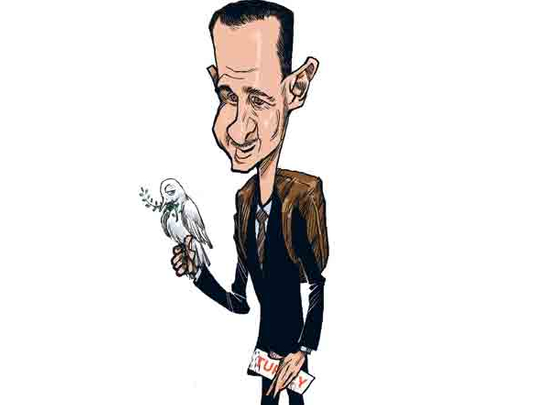
Regional media have been busy analysing President Bashar Al Assad's weekend visit to Turkey, where he spoke of a better future for the entire region, 10 years down the road. He also expressed his country's desire for peace, noting that "nobody wants war", yet adding that the Israelis were clearly uninterested in peace, which explains why they are also uninterested in Turkish mediation. The ‘no war, no peace' situation cannot continue forever, he said, noting that there would eventually be one or the other.
The Syrian visit to Turkey fits in nicely with a series of steps taken by both countries to move bilateral relations forward, including the recent signing of 51 agreements to boost relations in academia, economics, transport and culture. The two countries also recently lifted visa requirements. Turkey now has visa-free travel arrangements with six Arab countries — Syria, Lebanon, Libya, Morocco, Tunis and Jordan.
Turkish Prime Minister Recep Tayyip Erdogan explained it best, saying that a "regional Schengen system", similar to the agreement signed between European countries in Luxembourg in 1985, has now come into effect. As a result there is no longer any systematic border control between these countries, which are now closer to how they had been under the Ottoman Empire.
Trade between Syria and Turkey has increased from $800 million (Dh2.9 billion) to $2 billion (Dh7.4 billion). Political coordination is also continuing, particularly with Turkey now serving on a rotating seat at the UN Security Council — a crucial position this May, as the UN will try to pass new sanctions against Iran, which both Damascus and Ankara will oppose.
Politics aside, Syria aims to become a regional hub for gas, oil and transportation through its relationship with Turkey. When addressing one of the numerous Syrian-Turkish businessmen forums, Al Assad once spoke of an "economic space" that "one day will be complete, [where] we will then be linking the Mediterranean to the Caspian Sea, the Black Sea and the Arabian Gulf". He added, "When we link these four seas, we will become the obligatory connector for this entire world, in terms of investment and transport".
The same vision was outlined by Turkish President Abdullah Gul during a visit to Syria in the summer of 2009. Syria, after all, could serve as a hub for joint investments in energy, industry, agriculture, telecommunications, banking and technology. This is in addition to making Syria the link between Arab and Asian oil and gas and the European markets, via the Mediterranean. Turkey would then become a transfer point for electricity networks between Europe and the Arab and Asian world.
Much of that was on the table — in addition to political cooperation — during Al Assad's weekend visit to Turkey. Journalists prefer, however, to concentrate on political developments, and see the visit in terms of Syrian-US relations, the Scud crisis and the Middle East peace process.
Making progress
While the Western media debate these issues, tangible steps are being taken to realise the Syrian-Turkish vision for the region. Goods are being transported via rail from the Iraqi port city of Umm Qasr on the Gulf to the Syrian port city of Latakia, which lies on the Mediterranean. There is a project to bring the Kirkuk-Banias pipeline into operation, with a capacity of 200,000 barrels per day (bpd). Another pipeline is in the works, with a capacity of 1.4 million bpd, in addition to linking the Iraqi gas plant in Akkas to the Syrian one that already connects to the Jordanian and Egyptian pipelines, branching out of Syria, Lebanon and Europe. Erdogan put it brilliantly, promising to extract milk "even from the male goat" if the Syrians work with him, "hand-in-hand".
During a 2009 visit by Greek President Karolos Papoulias to Damascus, he said his country could serve as a connecting point between the Black Sea, the Adriatic and the Balkan Peninsula, where 4,000 Greek and Russian companies are already in operation. Syria believes it is capable of becoming the transshipment point for goods coming from the Mediterranean, the Gulf and neighbouring countries. This prospect was raised with the Turks on May 8, and with Russian President Dmitry Medvedev during his recent visit to Damascus on May 11.
To achieve their aims, the Syrians feel that they must advance economic reforms, thereby creating a healthy regional environment to attract investment. The services of private airlines would be a must, and so would a safe ground route linking the Syrian coast with the interior. Ultimately, the Syrians need peace in the Middle East. Unfortunately, this is becoming increasingly far-fetched, given the complete inability of the Obama administration to put any pressure on Israel, and Benjamin Netanyahu's decision to build 1,600 housing units in occupied East Jerusalem, and to deport no less than 70,000 Gazans from the West Bank. Achieving peace becomes very difficult — and so does any kind of regional development — when the Israelis are talking of war with Lebanon and accusing the Syrians of violating UN resolutions by providing Scud missiles to Hezbollah.
Perhaps very symbolically, in the Assad-Gul press conference, the Turkish president said that Syria was ready for peace talks, and so was Turkey. He noted, however, that Israel had not asked them to resume mediating.
Sami Moubayed is editor-in-chief of Forward Magazine.










